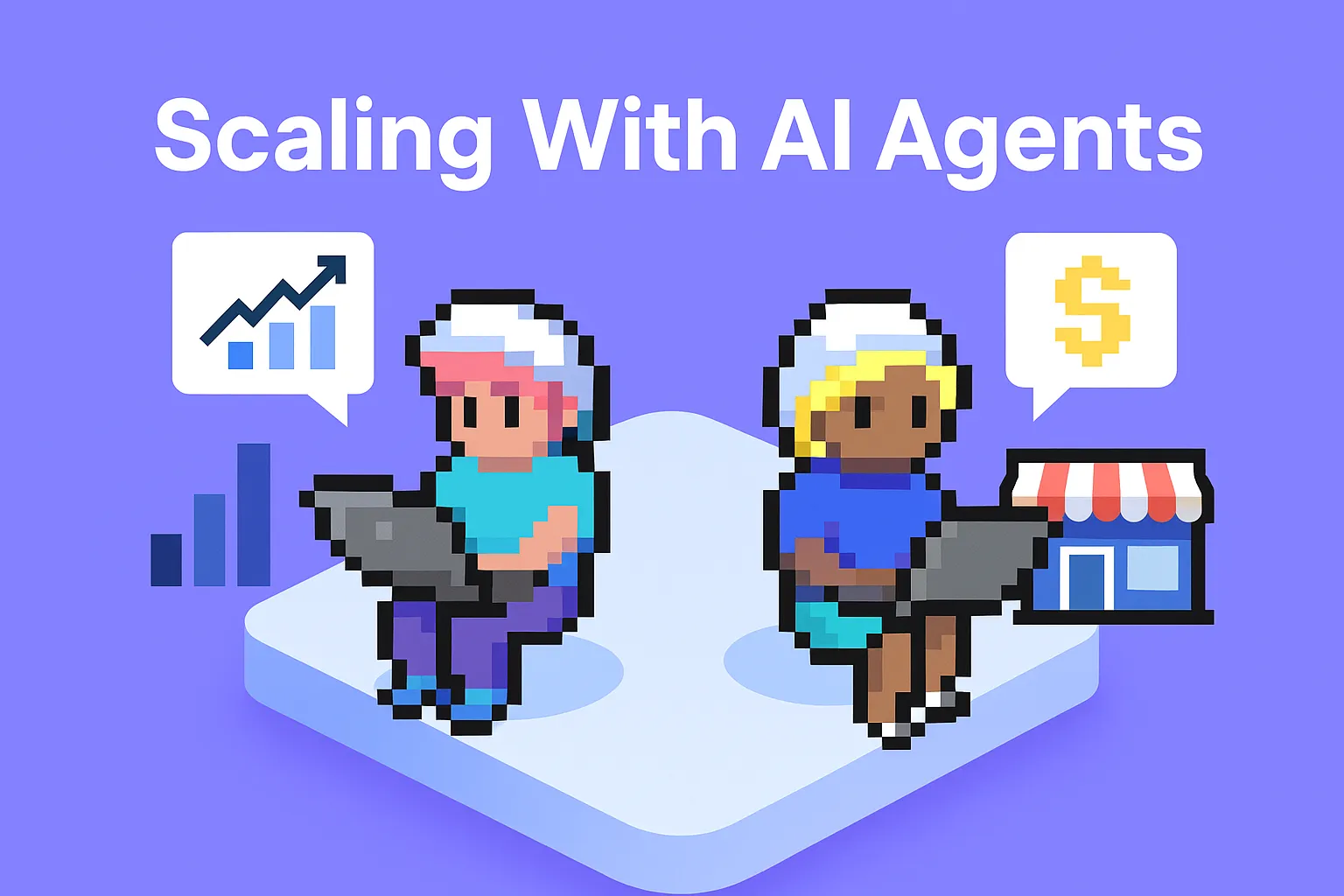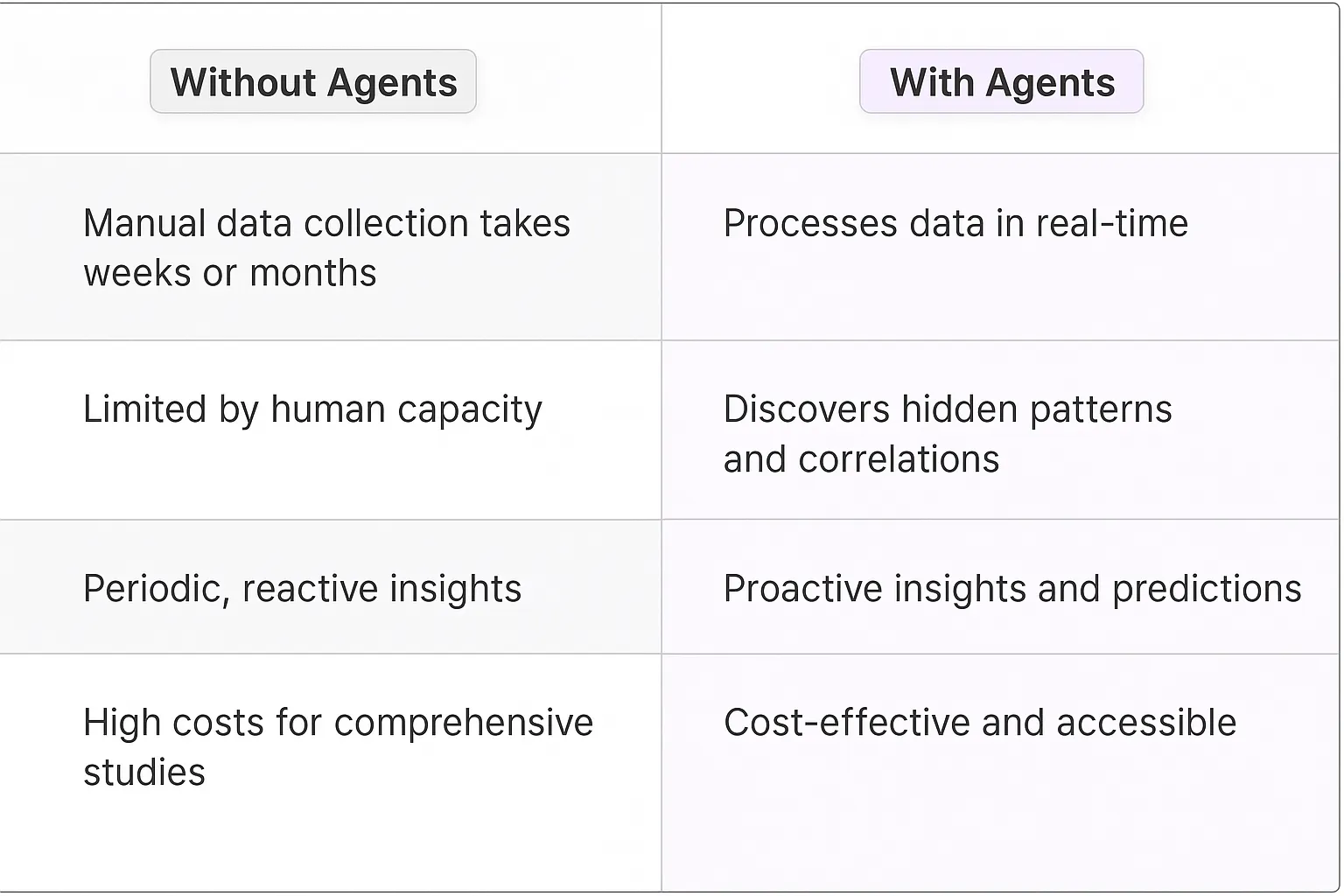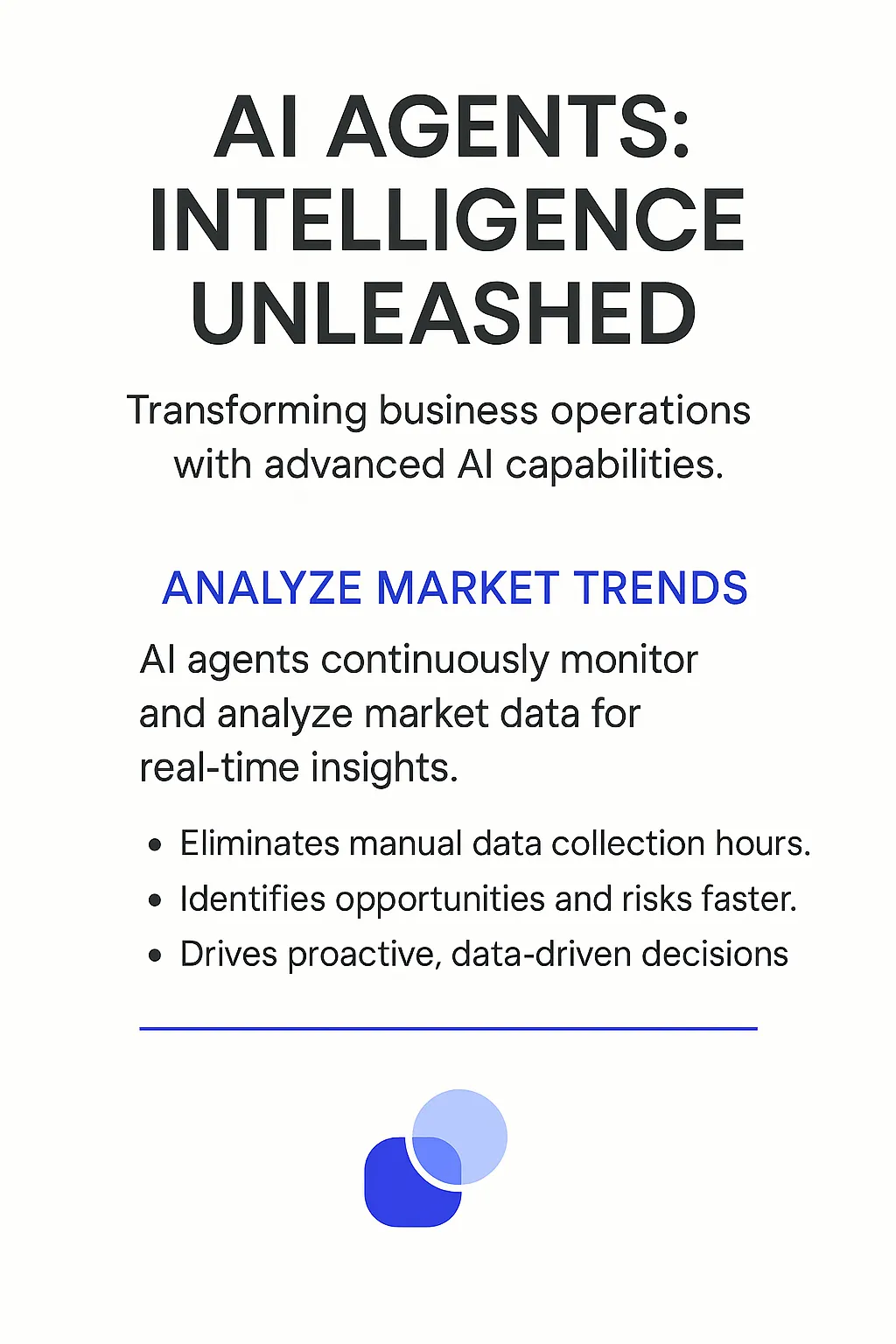Market Research AI Agents
The Evolution of Market Research in the AI Era
What is Market Research?
Market research is the process of gathering, analyzing, and interpreting information about a market, product, or service. It's the compass that guides businesses through the turbulent seas of consumer preferences, competitive landscapes, and emerging trends. Traditionally, it's been a time-consuming and resource-intensive process, often limited by human capacity to process and interpret data.
Key Features of Market Research
Market research typically involves data collection through surveys, focus groups, and data analysis. It aims to understand consumer behavior, identify market opportunities, and inform business strategies. Key features include audience segmentation, trend analysis, competitive intelligence, and demand forecasting. The goal is to reduce business risks by providing actionable insights that drive decision-making.

Benefits of AI Agents for Market Research
What would have been used before AI Agents?
Before AI agents entered the scene, market research was a slow, manual grind. Teams would spend weeks, sometimes months, sifting through mountains of data, conducting surveys, and running focus groups. It was like trying to piece together a massive jigsaw puzzle with half the pieces missing.
Companies relied heavily on human analysts who, despite their expertise, were limited by the sheer volume of information they could process. They'd use traditional statistical tools, spreadsheets, and basic data visualization software. But let's be real - these methods often led to analysis paralysis or worse, missing crucial insights hidden in the data noise.
What are the benefits of AI Agents?
Enter AI agents for market research, and suddenly we're playing a whole new ballgame. These digital teammates are like having a team of superhuman analysts working 24/7, never needing a coffee break.
First off, speed. AI agents can crunch through terabytes of data in minutes, not months. They're constantly scanning social media, news outlets, and online forums, giving you real-time insights into market trends and consumer sentiment. It's like having a finger on the pulse of the market at all times.
But it's not just about speed - it's about depth and breadth. AI agents can spot patterns and correlations that human analysts might miss. They can analyze data across multiple dimensions simultaneously, uncovering hidden market opportunities or potential threats that traditional methods might overlook.
Personalization is another game-changer. AI agents can segment audiences with incredible precision, allowing for hyper-targeted marketing strategies. They can predict consumer behavior based on vast amounts of historical and real-time data, helping companies stay ahead of market shifts.
Perhaps most importantly, AI agents democratize market research. Small startups can now access insights that were once the exclusive domain of big corporations with deep pockets. This levels the playing field and fosters innovation across the board.
The beauty of AI agents in market research is that they augment human capabilities rather than replace them. They free up human researchers to focus on strategy and creative problem-solving, while handling the heavy lifting of data processing and initial analysis.
In essence, AI agents are transforming market research from a reactive, periodic activity into a proactive, continuous process. They're not just changing the game - they're rewriting the rules entirely.

Potential Use Cases of AI Agents for Market Research
Processes
Market research AI agents are game-changers for businesses looking to gain a competitive edge. These digital teammates can transform how companies gather, analyze, and act on market intelligence. Let's dive into some key processes where they shine:
- Trend forecasting: AI agents can sift through vast amounts of data to identify emerging market trends before they hit the mainstream.
- Competitor analysis: These digital teammates can continuously monitor competitor activities, pricing strategies, and product launches, providing real-time insights.
- Consumer sentiment analysis: By analyzing social media, reviews, and online discussions, AI agents can gauge public opinion on brands and products with unprecedented accuracy.
- Market segmentation: AI can identify and categorize customer segments based on complex behavioral patterns and preferences, enabling hyper-targeted marketing strategies.
- Product development feedback: These agents can gather and synthesize customer feedback from multiple channels to inform product iterations and new feature development.
Tasks
Breaking down the processes into specific tasks, here's where market research AI agents truly flex their muscles:
- Data collection: AI agents can scrape websites, social media platforms, and online databases to gather relevant market data at scale.
- Survey design and analysis: They can craft targeted survey questions based on research objectives and analyze responses to extract meaningful insights.
- Focus group transcription and analysis: AI can transcribe focus group sessions and analyze the discussions to identify key themes and sentiments.
- Competitive pricing analysis: These digital teammates can track and compare pricing across competitors, alerting teams to significant changes or opportunities.
- Brand perception tracking: AI agents can monitor brand mentions across various platforms and analyze the context to gauge brand health and perception over time.
- Market size estimation: By analyzing multiple data sources, AI can provide more accurate and up-to-date market size estimates.
- Customer persona creation: AI can synthesize data from various sources to create detailed, dynamic customer personas that evolve with changing market conditions.
The integration of AI agents in market research is not just about automation; it's about augmenting human capabilities. These digital teammates enable researchers to focus on strategic thinking and creative problem-solving while handling the heavy lifting of data collection and initial analysis. As the market research landscape continues to evolve, those who effectively leverage AI agents will find themselves with a significant competitive advantage, able to make faster, more informed decisions in an increasingly complex business environment.

Industry Use Cases: AI Agents Reshaping Market Research
AI agents are fundamentally changing how we approach market research, offering capabilities that were once the stuff of sci-fi. These digital teammates are now integral to uncovering consumer insights, analyzing trends, and predicting market shifts with unprecedented accuracy and speed. Let's dive into some concrete examples of how different industries are leveraging AI agents to gain a competitive edge in their market research efforts.
From retail giants fine-tuning their product offerings to fintech startups decoding complex consumer behaviors, AI agents are proving to be game-changers. They're not just crunching numbers faster; they're uncovering patterns and insights that human researchers might miss, leading to more informed decisions and strategies. The following use cases demonstrate how AI is not just augmenting but transforming market research across various sectors.
Retail: Unlocking Consumer Insights with Market Research AI Agents
The retail industry is ripe for disruption by market research AI agents. These digital teammates can transform how brands understand and respond to consumer behavior, potentially reshaping the entire shopping experience.
Take a major clothing retailer like Zara. They could deploy AI agents to continuously monitor social media trends, fashion blogs, and online shopping patterns. These agents would process vast amounts of data in real-time, identifying emerging styles and predicting which designs are likely to resonate with different customer segments.
But here's where it gets interesting: these AI agents wouldn't just passively collect data. They'd actively engage with consumers through chatbots and personalized surveys, diving deep into the 'why' behind purchasing decisions. They could simulate different pricing strategies and product combinations, forecasting how these changes might impact sales across various demographics.
The result? A retail giant that can pivot its inventory and marketing strategies almost instantaneously, staying ahead of fashion trends and consumer preferences. This isn't just about faster data processing - it's about creating a feedback loop between consumers and the brand that's so tight, it almost feels prescient.
Imagine walking into a Zara store where the layout, product mix, and even the music playing are optimized based on real-time data about local preferences and global trends. That's the power of market research AI agents in retail - turning shopping into a hyper-personalized experience that feels magical to the consumer while driving significant bottom-line improvements for the business.
This application of AI in retail market research isn't just evolutionary; it's revolutionary. It has the potential to redefine the relationship between brands and consumers, creating a level of responsiveness and personalization that was previously unimaginable. And for the retailers who get it right, it could be the key to dominating in an increasingly competitive and fast-paced market.
Finance: AI Agents Reshaping Investment Strategies
The finance industry is on the cusp of a major shift, with market research AI agents poised to transform how investment firms operate. These digital teammates aren't just crunching numbers faster - they're fundamentally changing the game.
Consider a hedge fund like Bridgewater Associates. They could deploy AI agents to analyze not just traditional financial data, but also to scrape and interpret vast amounts of unstructured data from news articles, social media, and even satellite imagery. These agents would work 24/7, identifying subtle market signals and correlations that human analysts might miss.
But here's where it gets really interesting: these AI agents could simulate countless investment strategies, testing strategies against historical data and projected future events. They'd learn from each simulation, continuously refining their models and adapting to new market conditions.
The implications are profound. We're talking about investment strategies that evolve in real-time, responding to global events as they unfold. A natural disaster in Asia? The AI immediately adjusts portfolio allocations. A surprise political announcement in Europe? The system instantly recalibrates risk assessments.
This isn't just about faster trades or marginally better returns. It's about creating an entirely new paradigm for investment decision-making. Imagine a world where investment strategies are as dynamic and responsive as the markets themselves.
For the firms that get this right, the competitive advantage could be enormous. They'd essentially have a crystal ball - not one that predicts the future with certainty, but one that can rapidly process and respond to the complexity of global markets in ways that were previously impossible.
Of course, this raises some big questions. How do we ensure these AI agents don't create or exacerbate market instabilities? What happens to human fund managers in this scenario? And how do we regulate a financial system where decisions are increasingly made by AI?
These are challenges we'll need to grapple with. But one thing's for sure: market research AI agents are set to redefine what's possible in finance. The firms that embrace this technology won't just be playing a better game - they'll be playing an entirely different game altogether.
Considerations
Technical Challenges
Implementing a Market Research AI Agent isn't just about plugging in some fancy algorithm and watching the magic happen. It's more like trying to teach a toddler quantum physics while juggling flaming torches. The first hurdle? Data quality. Your AI is only as good as the data it's fed, and let's face it, most market data is messier than a teenager's bedroom.
Then there's the integration nightmare. Your shiny new AI needs to play nice with existing systems, from CRMs to data warehouses. It's like introducing a vegan to a steakhouse - there's bound to be some friction. And don't even get me started on the scalability issues. As your market research needs grow, your AI agent needs to keep up without breaking a sweat or your bank account.
Operational Challenges
On the operational side, things get even trickier. First off, you need to deal with the "black box" problem. Your AI is making decisions, but can you explain why? If not, good luck getting buy-in from skeptical executives or regulatory bodies. It's like trying to explain why you chose that particular outfit - sometimes you just can't articulate it.
Then there's the skills gap. Unless you're sitting on a goldmine of AI talent (and if you are, call me), you'll need to either train your existing team or hire new blood. Both options are about as easy as teaching a cat to swim - possible, but not without some scratches.
Lastly, there's the ever-present challenge of change management. Introducing an AI agent into your market research process is like dropping a fox into a henhouse - it's going to ruffle some feathers. You'll need to manage expectations, allay fears, and prove the AI's worth, all while keeping the lights on. It's a balancing act that would make even the most seasoned circus performer sweat.
The AI-Powered Future of Market Research
AI agents are not just enhancing market research; they're redefining it. These digital teammates are turning what was once a periodic, reactive process into a continuous, proactive one. They're democratizing access to high-quality market intelligence, enabling businesses of all sizes to compete on a more level playing field.
However, the road to implementation is not without its bumps. Technical challenges like data quality and system integration, along with operational hurdles such as the skills gap and change management, need to be navigated carefully. But for those who successfully integrate AI agents into their market research processes, the rewards are substantial.
We're entering an era where market research becomes more of a real-time, predictive discipline rather than a retrospective one. AI agents are enabling businesses to not just react to market changes, but to anticipate and shape them. As these technologies continue to evolve, those who embrace them will find themselves with a significant competitive advantage, able to make faster, more informed decisions in an increasingly complex business environment.
The future of market research is here, and it's powered by AI. The question isn't whether to adopt these technologies, but how quickly and effectively you can integrate them into your business strategy. The market waits for no one, and with AI agents, you don't have to.













